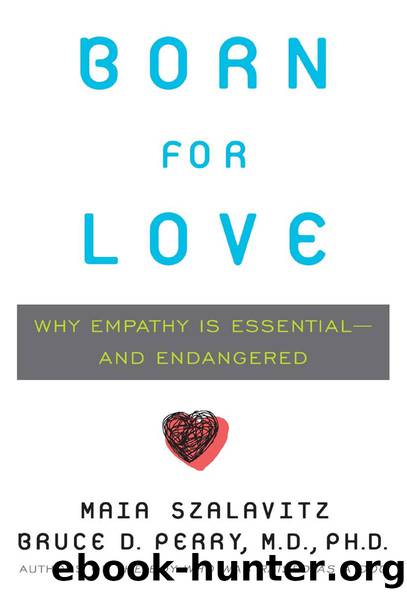Born for Love: Why Empathy Is Essential--and Endangered by Bruce D. Perry & Maia Szalavitz

Author:Bruce D. Perry & Maia Szalavitz [Perry, Bruce D.]
Language: eng
Format: epub
Publisher: HarperCollins
Published: 2010-03-18T23:00:00+00:00
WITHIN A FEW months, Alyson couldn’t imagine what had possessed her to befriend the gang girls and why she had participated in the assault. As a Goth, she had demonstrated against war; unlike her former friends, she did well in school and her goals in life were completely different from theirs. She didn’t even really like their music or style. But she needed to fit in, and she found herself among them when she no longer felt safe or accepted by the Goths. So, as she’d done before, she changed her colors to blend in. She felt she needed to belong somewhere. Being an outsider was much worse than being part of a “bad” crowd.
And that’s the perspective of almost all teens. Fitting in matters more than anything else. As a result, although schools and governments repeatedly design and utilize programs to try to help adolescents “resist peer pressure” to engage in risky or violent behavior like Alyson’s, very few such efforts are highly effective. Teen drinking and teen drug use remain with us, as do all kinds of other activities that parents would love to prevent. Unfortunately, many programs imagine peer pressure as an overt, external force, having teens engage in role plays where they “just say no.” In fact, most peer pressure is subtle, internal, and sometimes unconscious. Many youths “say yes” without ever having been asked a question or pressured at all: they simply mirror the behavior of others. At this age, in these contexts, friends matter more.
In fact, research that has followed teenagers into adulthood finds that those who follow the crowd tend to be healthier than those who ignore it. Adolescents who care about how other people see them have more friends, better relationships with their families, better grades—and more empathy.19 Those who don’t worry much about their peers’ opinions are the ones who are likely to pull others into misbehavior. Indeed, being unconcerned about those around you is basically the definition of being antisocial. Such teens don’t care that their parents don’t want them to drink, take drugs, or have sex. If their friends think they are “crazy,” it doesn’t bother them. These teens tend to find and egg one another on. Problems occur—as in Alyson’s situation—when adolescents who do not have histories of antisocial behavior fall in with crowds of teens who do and copy their behavior.
Programs to prevent risky teen behaviors that work to any extent at all recognize this. Rather than trying to fight peer influence, they attempt to use it positively. For example, instructors emphasize the fact that teens who engage in binge drinking are a minority, rather than trying to get teens to fight against the crowd.20 Instead of grouping troubled teens together, effective programs work to keep them in the community and place them in situations where youths who are doing well can serve as role models.21 They keep the antisocial youths from making one another worse.
Because ultimately, constantly resisting group pressures—especially for teens—is like resisting sleep. Sooner or later, no matter how hard you try to continue to stay awake when tired, you will nod off.
Download
This site does not store any files on its server. We only index and link to content provided by other sites. Please contact the content providers to delete copyright contents if any and email us, we'll remove relevant links or contents immediately.
| Administration & Medicine Economics | Allied Health Professions |
| Basic Sciences | Dentistry |
| History | Medical Informatics |
| Medicine | Nursing |
| Pharmacology | Psychology |
| Research | Veterinary Medicine |
The Art of Thinking Clearly by Rolf Dobelli(10489)
The 5 Love Languages: The Secret to Love That Lasts by Gary Chapman(9815)
Mindhunter: Inside the FBI's Elite Serial Crime Unit by John E. Douglas & Mark Olshaker(9344)
Becoming Supernatural by Dr. Joe Dispenza(8217)
Nudge - Improving Decisions about Health, Wealth, and Happiness by Thaler Sunstein(7709)
The Road Less Traveled by M. Scott Peck(7603)
Mastermind: How to Think Like Sherlock Holmes by Maria Konnikova(7347)
Enlightenment Now: The Case for Reason, Science, Humanism, and Progress by Steven Pinker(7314)
Win Bigly by Scott Adams(7199)
The Way of Zen by Alan W. Watts(6614)
Factfulness: Ten Reasons We're Wrong About the World – and Why Things Are Better Than You Think by Hans Rosling(4742)
The State of Affairs by Esther Perel(4721)
Gerald's Game by Stephen King(4654)
Man's Search for Meaning by Viktor Frankl(4607)
The Confidence Code by Katty Kay(4262)
Thinking in Bets by Annie Duke(4227)
The Healing Self by Deepak Chopra(3581)
Hidden Persuasion: 33 psychological influence techniques in advertising by Marc Andrews & Matthijs van Leeuwen & Rick van Baaren(3566)
The Worm at the Core by Sheldon Solomon(3487)
